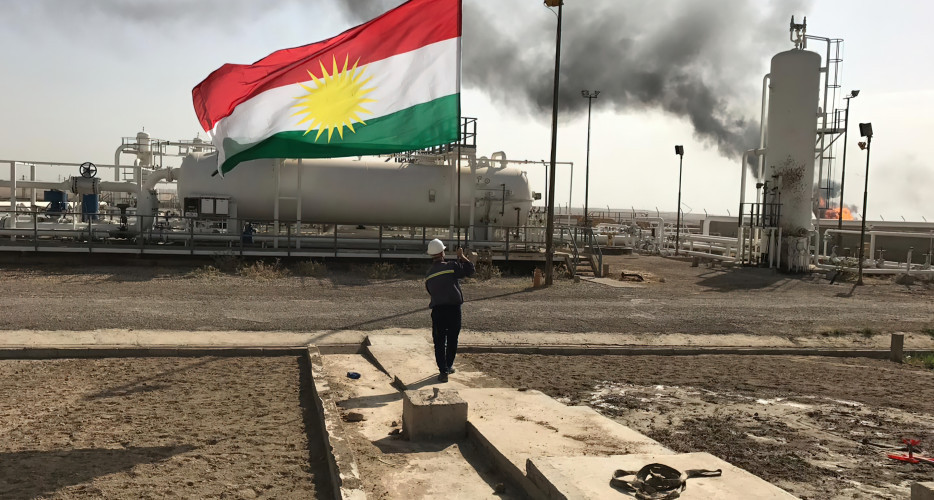
Peregraf- Ghamgin Mohammed
Oil companies in the Kurdistan Region are polluting villages and green areas with toxic by-products and enjoy effective impunity from the Kurdistan Regional Government (KRG) impunity.
Residents of Ilnjagh village in Koya have protested on multiple occasions against the heavy truck traffic and waste spilled by oil companies. Salar Sulaiman, who lives in the village, said that his neighbors are working with those from nine nearby villages organize around the issue.
"We have been demonstrating for a week. We have conveyed our problems and complaints to the governor of Koya and the [KRG] Ministry of Natural Resources, but none of our demands have been implemented yet," Sulaiman told Peregraf.
There are two oil fields in Koya district: Tawke and Taq Taq. They have been operational since 2006.
The companies "have not repaired the roads, but they have damaged them with their trucks. They have not planted any trees and there is no greenery," he said.
According to the laws of the KRG, oil companies and factories are supposed to pay compensation caused to infrastructure and the environment that results from their operations.
Koya Governor Tariq Haider confirmed the villagers' claims, saying that "the oil companies operating in Koya do not comply with environmental guidelines and have caused damage to the area."
He told Peregraf that the local government has written to the relevant authorities several times, but has not received any concrete response.
Oil companies in the Kurdistan Region are notorious for failing to dispose of their waste and by-products according to regulations. This allows toxins to seep into the soil and groundwater.
Dr. Nali Jawad, a university professor and environmental expert, told Peregraf that the environmental safety measures for oil companies are insufficient.
"They have left a very bad impact on the entire environment. They have destroyed the areas they travel through," Jawad said.
Most oil companies and factories install simple filters to protect against the emissions from their refineries, but these fall short of international standards. This allows carbon dioxide, other greenhouse gasses, and dangerous chemicals to escape, which contributes to climate change, pollution, and diseases.
Razzaq Khaylani, spokesperson for the Kurdistan Regional Environment Board, told Peregraf that all new projects, including oil companies, must comply with environmental guidelines outlined by the Ministry of Natural Resources.
According to the laws and regulations of the Kurdistan Region, villagers should be the primary beneficiaries of the work of oil companies through better infrastructure and job opportunities. However, this rarely happens.
Sherko Judet, a former MP in the Kurdistan Parliament, said that there are 56 oil blocks in the Kurdistan Region and 52 companies working them. Ninety-two percent are located in Erbil and Duhok governorates.
There are also a number of illegal refineries operating, said Judet, who was a member of the Energy and Natural Resources Committee.
The situation is the same across the Kurdistan Region for any resident that lives near an oil operation.
In the Garmian administration, the villagers in Hasira, Mirqasim, and Kawachermo say that their cars and anything they leave outside inevitably becomes coated in a black film. It is the result of the smoke and pollution from a nearby refinery. These pollutants have been shown to increase the risk of cancer in nearby communities.
"The oil companies have no obligation to the environment and citizens," villager Ibrahim Zarif told Peregraf. "The main goal of officials is to get money and nothing else."
Oil companies have a social responsibility to manage the negative effects of their operations, but they rarely live up to that standard. According to the laws of the Kurdistan Region, the companies could be fined hundreds of millions of Iraqi dinars for failing to plant new trees or install proper filters and polluting the air, water, and soil.
"The authorities are aware of the encroachment of oil companies on the environment, but on the pretext that oil is the main source of revenue for the Region, the authorities ignore all their violations," said Jawad.
Peregraf contacted officials from the Ministry of Natural Resources and several oil companies, but they declined to comment.
Karim Ali, a member of the Sulaimaniyah Provincial Council, told Peregraf he had spoken to the environmental authorities, "but they have no position worth mentioning and have not been able to submit their reports to court against environmental pollution."
For villagers, the challenge of taking on the oil companies and their protectors in government seems insurmountable.
"There is nothing called law, human rights, health, safety, environmental protection, and quality of work within the agenda of oil companies. They are the enemies of all five sectors of the environment: water, air, soil, biodiversity, and noise," Zarif said.
"The biggest enemy of the environment is the Kurdistan Regional Government," he added.
Due to this protection, the work of oil companies is not transparent and not subject to oversight from either the provincial councils or the Kurdistan Parliament.
"The Ministry of Natural Resources has treated the oil companies as a security agency," Zarif said. "They have not shown any mercy to the environment in their work."